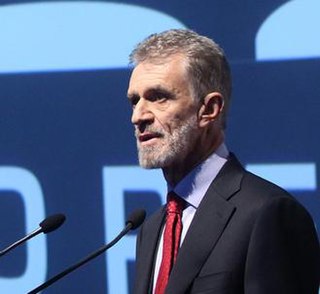Related Research Articles
Model predictive control (MPC) is an advanced method of process control that is used to control a process while satisfying a set of constraints. It has been in use in the process industries in chemical plants and oil refineries since the 1980s. In recent years it has also been used in power system balancing models and in power electronics. Model predictive controllers rely on dynamic models of the process, most often linear empirical models obtained by system identification. The main advantage of MPC is the fact that it allows the current timeslot to be optimized, while keeping future timeslots in account. This is achieved by optimizing a finite time-horizon, but only implementing the current timeslot and then optimizing again, repeatedly, thus differing from a linear–quadratic regulator (LQR). Also MPC has the ability to anticipate future events and can take control actions accordingly. PID controllers do not have this predictive ability. MPC is nearly universally implemented as a digital control, although there is research into achieving faster response times with specially designed analog circuitry.
In control theory, robust control is an approach to controller design that explicitly deals with uncertainty. Robust control methods are designed to function properly provided that uncertain parameters or disturbances are found within some set. Robust methods aim to achieve robust performance and/or stability in the presence of bounded modelling errors.

Willis Harmon Ray is an American chemical engineer, control theorist, applied mathematician, and a Vilas Research emeritus professor at the University of Wisconsin–Madison notable for being the 2000 winner of the prestigious Richard E. Bellman Control Heritage Award and the 2019 winner of the Neal Amundson Award.
Michael Athans was a Greek-American control theorist and a Professor Emeritus in the Department of Electrical Engineering and Computer Science at the Massachusetts Institute of Technology. He was a Fellow of the IEEE (1973) and a Fellow of the AAAS (1977). He was the recipient of numerous awards for his contributions in the field of control theory. A pioneer in the field of control theory, he helped shape modern control theory and spearheaded the field of multivariable control system design and the field of robust control. Athans was a member of the technical staff at Lincoln Laboratory from 1961 to 1964, and a Department of Electrical Engineering and Computer Science faculty member from 1964 to 1998. Upon retirement, Athans moved to Lisbon, Portugal, where he was an Invited Research Professor in the Institute for Systems and Robotics, Instituto Superior Técnico where he received a honoris causa doctorate from the Universidade Técnica de Lisboa in 2011.
The Donald P. Eckman Award is an award given by the American Automatic Control Council recognizing outstanding achievements by a young researcher under the age of 35 in the field of control theory. Together with the Richard E. Bellman Control Heritage Award, the Eckman Award is one of the most prestigious awards in control theory.
Miroslav Krstić is an American control theorist and Distinguished Professor of Mechanical and Aerospace Engineering at the University of California, San Diego (UCSD). Krstić is also the director of the Center for Control Systems and Dynamics at UCSD and a Senior Associate Vice Chancellor for Research. In the list of eminent researchers in systems and control, he is the youngest.
Jeff S. Shamma is an American control theorist. He is the Department Head and Professor of Industrial and Enterprise Systems Engineering at the University of Illinois Urbana-Champaign. Formerly, he was a Professor of Electrical engineering at the King Abdullah University of Science and Technology. Before that, he held the Julian T. Hightower Chair in Systems & Control Systems and Controls at the Georgia Institute of Technology. He is known for his early work in nonlinear and adaptive control, particularly on gain scheduling, robust control, and more recently, distributed systems.
Richard D. Braatz is the Edwin R. Gilliland Professor at the Massachusetts Institute of Technology known for his research in control theory and its applications to chemical, pharmaceutical, and materials systems.
The IEEE Control Systems Award is a technical field award given to an individual by the Institute of Electrical and Electronics Engineers (IEEE) "for outstanding contributions to control systems engineering, science or technology". It is an IEEE-level award, created in 1980 by the board of directors of the IEEE, but sponsored by the IEEE Control Systems Society.

Dragoslav D. Šiljak is professor emeritus of Electrical Engineering at Santa Clara University, where he held the title of Benjamin and Mae Swig University Professor. He is best known for developing the mathematical theory and methods for control of complex dynamic systems characterized by large-scale, information structure constraints and uncertainty.

Wassim Michael Haddad is a Lebanese-Greek-American applied mathematician, scientist, and engineer, with research specialization in the areas of dynamical systems and control. His research has led to fundamental breakthroughs in applied mathematics, thermodynamics, stability theory, robust control, dynamical system theory, and neuroscience. Professor Haddad is a member of the faculty of the School of Aerospace Engineering at Georgia Institute of Technology, where he holds the rank of Professor and Chair of the Flight Mechanics and Control Discipline. Dr. Haddad is a member of the Academy of Nonlinear SciencesArchived 2016-03-04 at the Wayback Machine for recognition of paramount contributions to the fields of nonlinear stability theory, nonlinear dynamical systems, and nonlinear control and an IEEE Fellow for contributions to robust, nonlinear, and hybrid control systems.
Gunnar Johannsen is a German cyberneticist, and Emeritus Professor of Systems Engineering and Human-Machine Systems at the University of Kassel, known for his contributions in the field of human-machine systems.
Parametric programming is a type of mathematical optimization, where the optimization problem is solved as a function of one or multiple parameters. Developed in parallel to sensitivity analysis, its earliest mention can be found in a thesis from 1952. Since then, there have been considerable developments for the cases of multiple parameters, presence of integer variables as well as nonlinearities.
Efstratios N. (Stratos) Pistikopoulos is a distinguished research professor at the Department of Chemical Engineering at Texas A&M University, as well as the director of the Texas A&M Energy Institute. From 1991-2015, he was a professor for chemical engineering at Imperial College, where he pioneered multi-parametric programming and invented the concept of explicit or multi-parametric model predictive control. He has authored and co/authored more than 350 peer reviewed journal articles, authored and/or edited 9 books and has been an invited speaker to many academic conferences and lectures, including the 21st Professor Roger W. H. Sargent lecture at Imperial College London entitled "Multi-Parametric Programming & Control 25 years later: what is next?". Additionally, Pistikopoulos has been elected a fellow of the Royal Academy of Engineering in 2013.
Karl Henrik Johansson is a Swedish researcher and best known for his pioneering contributions to networked control systems, cyber-physical systems, and hybrid systems. His research has had particular application impact in transportation, automation, and energy networks. He holds a Chaired Professorship in Networked Control at the KTH Royal Institute of Technology in Stockholm, Sweden. He is Director of KTH Digital Futures.

Roberto Tempo was an Italian scientist, known for his studies on complex networked systems in information technology.
In regression analysis, an interval predictor model (IPM) is an approach to regression where bounds on the function to be approximated are obtained. This differs from other techniques in machine learning, where usually one wishes to estimate point values or an entire probability distribution. Interval Predictor Models are sometimes referred to as a nonparametric regression technique, because a potentially infinite set of functions are contained by the IPM, and no specific distribution is implied for the regressed variables.

Gabriela Hug-Glanzmann is a Swiss electrical engineer and an associate professor and Principal Investigator of the Power Systems Laboratory at the Swiss Federal Institute of Technology (ETH) Zürich within the Department of Information Technology and Electrical Engineering. Hug studies the control and optimization of electrical power systems with a focus on sustainable energy.
Maamar Bettayeb is a control theorist, educator and inventor. He is the author of publications on understanding the singular value decomposition and model order reduction. Bettayeb is also a promoter of scientific research.
References
- ↑ Garcia, C.E.; Pret, D.M.; Morari, M (1989), "Model Predictive Control - Theory and Practice - A Survey", Automatica, 25 (3): 335–348, doi:10.1016/0005-1098(89)90002-2
- ↑ Bemporad, A; Morari, M (1999), "Control of systems integrating logic, dynamics, and constraints", Automatica, 35 (3): 407–427, doi:10.1016/s0005-1098(98)00178-2
- ↑ Garcia, C.E.; Morari, M (1982), "Internal Model Control 1 A Unifying Review and Some New Results", Industrial & Engineering Chemistry Process Design and Development, 21 (2): 308–323, doi:10.1021/i200017a016
- ↑ Kothare, M.V.; Balakrishnan, V.; Morari, M (1996), "Robust constrained model predictive control using linear matrix inequalities", Automatica, 32 (10): 1361–1379, doi:10.1016/0005-1098(96)00063-5
- ↑ Morari, M; Zafiriou, E (1989), Robust Process Control, Prentice Hall, ISBN 978-0-13-782153-2
- ↑ "IEEE Control Systems Award Recipients" (PDF). IEEE . Retrieved March 30, 2011.
- ↑ "IEEE Control Systems Award". IEEE Control Systems Society. Archived from the original on 2010-12-29. Retrieved March 30, 2011.
- ↑ "Prof. Morari received Bellman control award". ETH . Retrieved August 16, 2012.
- ↑ "Richard E. Bellman Control Heritage Award". American Automatic Control Council . Retrieved February 10, 2013.